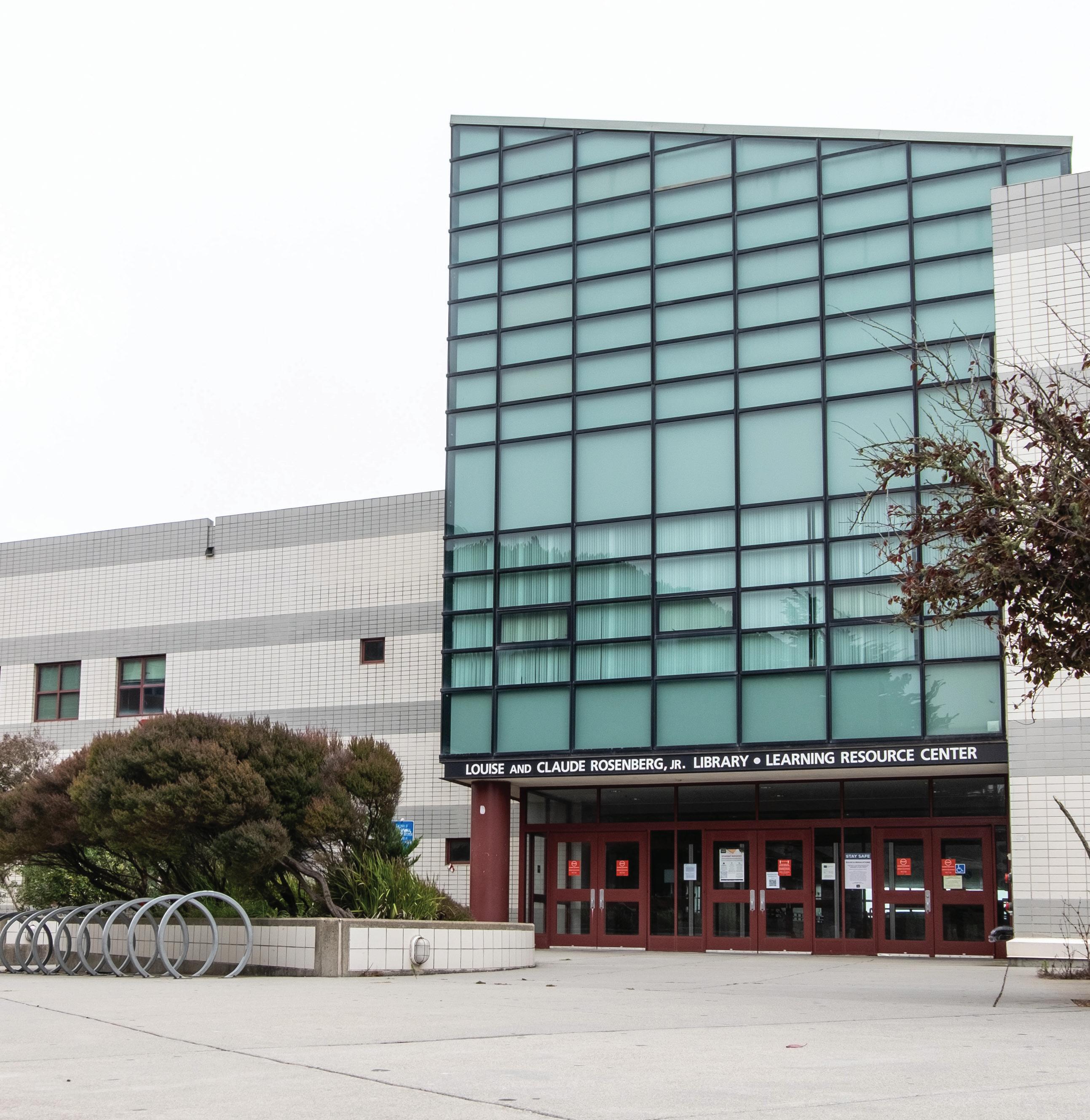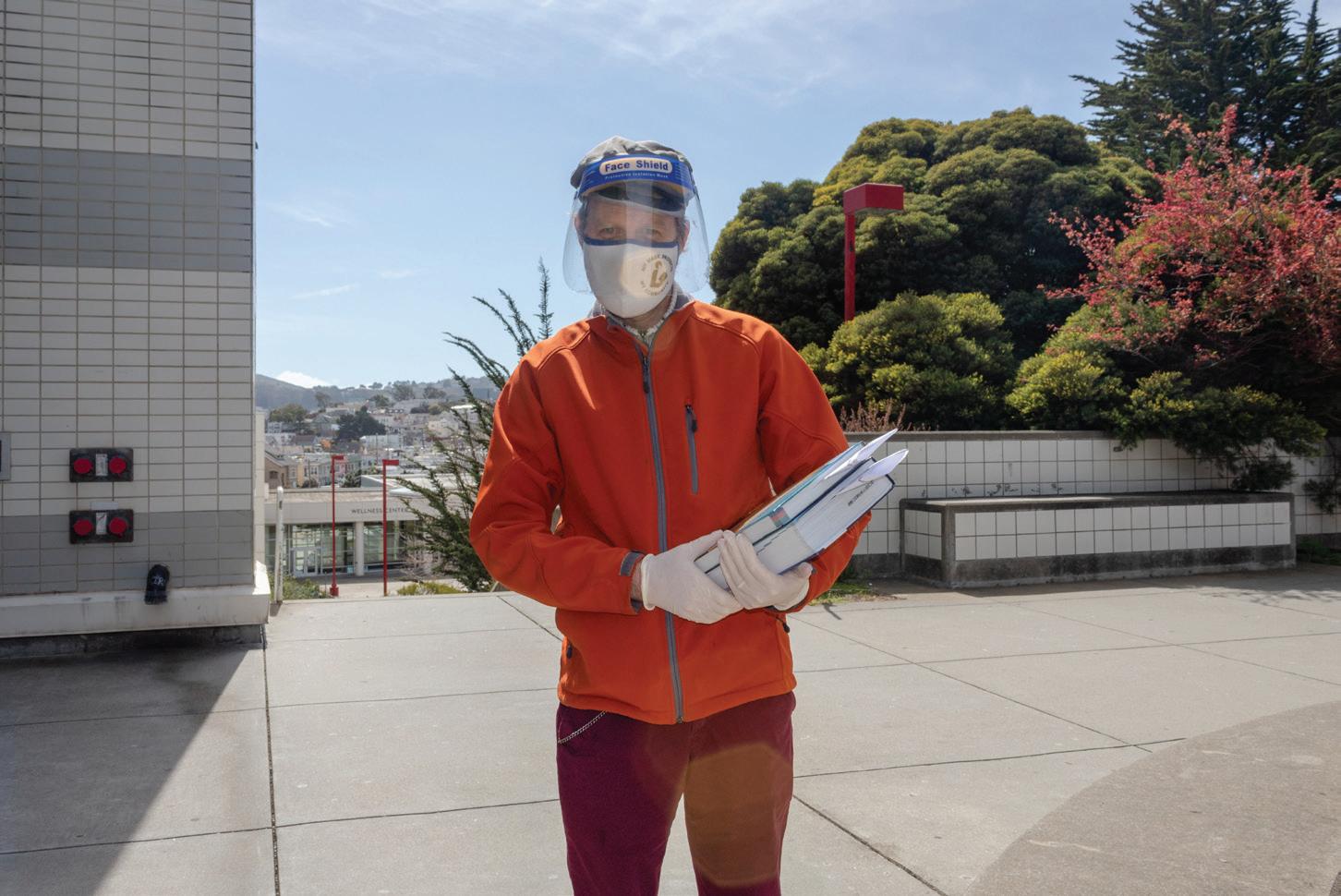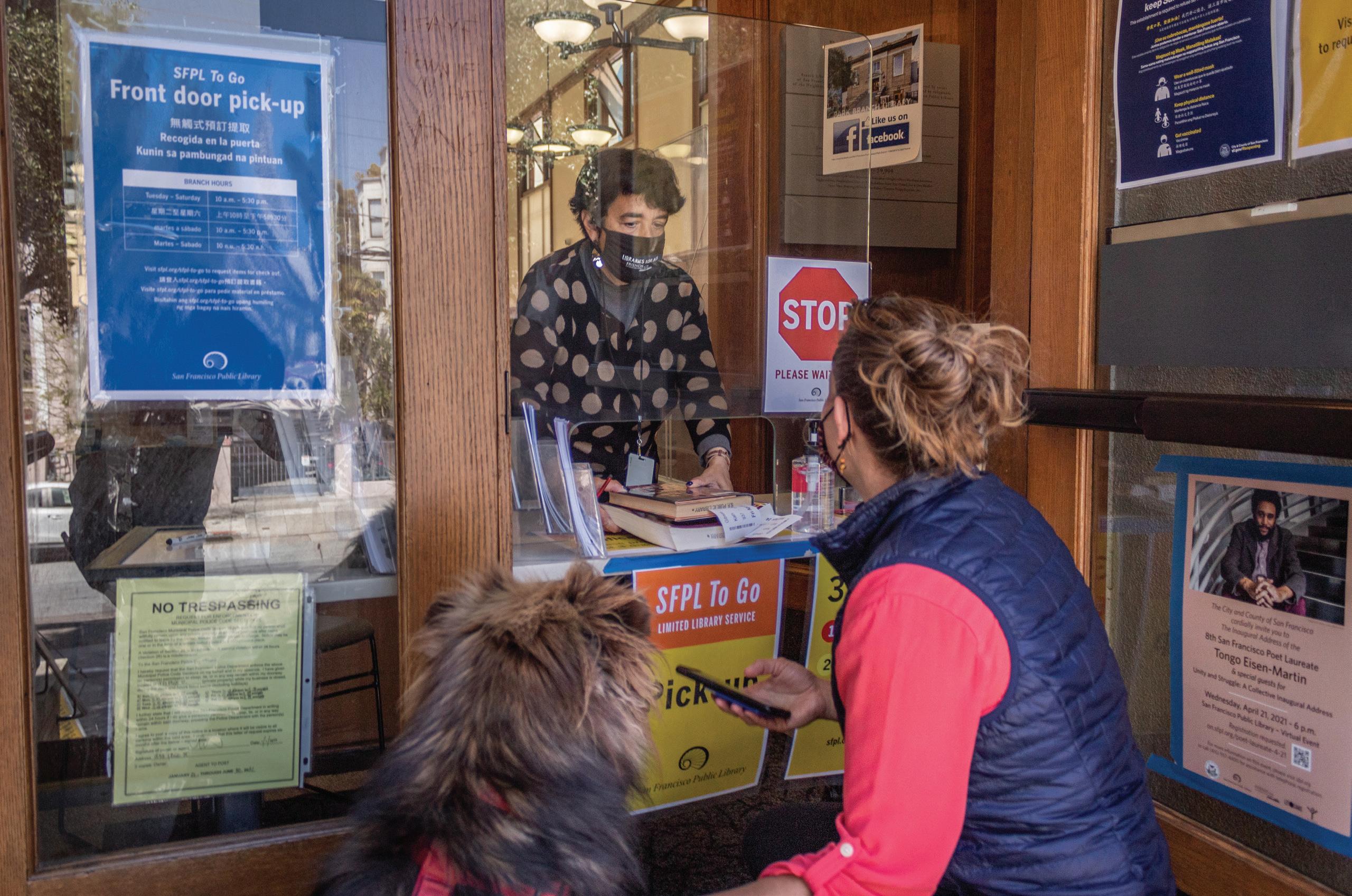
8 minute read
Open Doors, Open Minds
City College’s Louise and Claude Rosenberg Jr. Library shut down in March 2020 and remains closed at least through early May 2021 due to COVID-19.
City College and San Francisco Public Libraries make their services available
Advertisement
during the pandemic Story by Connie Chu Photography by Kevin Kelleher
On a cold San Francisco day, Librarian Brian Darr steps outside from the Rosenberg Library on the City College Ocean campus. He walks past an A-frame sign informing students picking up books to call the circulation desk.
He holds a paperback in his hand, a book reserved through the library’s contactless curbside pickup program. Receptive and friendly, Darr hands it to a student and informs her of its due date.
The pandemic shuttered the City College libraries in March 2020. “City College Library closed all library locations to students and the public,” says Anthony Costa, Chair of the Library and Learning Resources Department.
Around October, City College created the curbside pickup program to accommodate students with their library needs. Since then, the library has been providing the contact-free services at Rosenberg Library only.
The changes adversely impacted City College library staff. “Almost all of our part-time librarians have been offered fewer hours starting fall 2020. About seven part-time librarians who wanted assignments in fall 2020 did not get them,” Costa says. Full-time librarians have also been hit. “We currently have 17 fulltime faculty librarians. Six of them have received pink slips,” he says. This arrangement will most likely continue through the 2021 summer session.
Before the pandemic, Darr worked at the City College’s Downtown Center Library, where the sounds of bustling students hurrying to classes has been replaced by an eerie silence. He now works at City College’s contact-free curbside pickup program.
Through OneSearch, the City College library database, students can request books. After requesting books, they receive an email that their order is ready at Rosenberg Library, and they reserve a timeslot for pickup. When they arrive at the library, they call the circulation desk, and a librarian walks out to them, checks their student ID, and hands them the requested books. The service is free to registered City College students. Students can return books at a dropoff box located at the Rosenberg Library entrance.

Brian Darr is a library technical assistant at City College. He used to work at the Downtown Center library before the pandemic but now hands off reserved books as part of the curbside pickup program.
Reserved books line the desks of the Park Branch of the San Francisco Public Library, ready for members to pick up at assigned times as part of the SFPL To Go program. All branches of the SFPL were closed in March 2020 due to the pandemic and are slowly reopening.

Students are allowed to keep their checked out items until the end of the term.
If students request materials located in other campus libraries, all of which remain closed at the time of this article, a faculty member retrieves and delivers them to Rosenberg for pickup.
Similar to the City College curbside pickup program, the San Francisco Public Library, SFPL, has a service called SFPL To Go. However, patrons are only allowed to borrow books for three weeks according to Park Branch Librarian Leila Sarkisian.
When both contact-free pickup programs began last October, SFPL To Go was only available at the Main Branch Library in the Civic Center. It has since expanded and is now available at over 20 branch locations throughout San Francisco.
Anyone with a valid SFPL card can order books online through their website. They can also order DVDs, download e-books, listen to music, and stream movies. Whereas at City College, students can obtain digital media only through the media resource center.
Both library systems are operating with reduced staff. According to Donna Reed, City College Dean of Library and Learning Resources, “While the College is in remote mode, all librarians are working remotely.”
At the SFPL, the entire library staff was kept on payroll, but 41% of the library’s workforce were redeployed as Disaster Service Workers to support the City’s emergency response efforts. This is according to Michelle Jeffers, SFPL Chief of Community Programs and Partnerships.

Lisa Booker deposits books in the book drop at the Rosenberg Library. She had borrowed them through the library’s curbside checkout program.


Librarian Leila Sarkisian hands Katie Gibson her reserved books at the Park Branch of the San Francisco Public Library. Sarkisian’s dog Ogden is at left.
When the pandemic hit, the SFPL 100 might show up and fill an overflow services. Other neighborhood adapted by creating the 24/7 Virtual room,” Jeffers says. Due to the pandemic, branches will follow suit and resume Library, offering digital resources like in 2020 the SFPL hosted a virtual event. in-person services too, according to an e-books, e-audiobooks, movie streaming, “More than 2,000 people from around the April 2021 memo by San Francisco City research databases and digital magazines world participated in the featured talk Librarian Michael Lambert. and newspapers. They began issuing with author Chanel Miller,” she says. For City College however, “There are no electronic library cards for new patrons. City College librarians also adapted and immediate plans for students to return to
According to the 2019-2020 SFPL expanded online services. Through the the library spaces in the fall,” according Annual Report, they have experienced City College Library Virtual Campus site, to Reed. Instead, the City College a surge in virtual traffic. Overall “More than 2,000 people from around the world libraries plan on expanding usage of their digital resources were up by participated in the featured talk with author contact-free service hours at 63% in 2020. In particular, usage of Chanel Miller.” — Michelle Jeffers the Rosenberg Library and plan to their film streaming service, Kanopy, librarians are available 24/7 for students have limited contact-free services at the increased 105%. who seek help with research. Mission, Chinatown/NorthBeach and
One City One Book, the citywide They provide support to students in John Adams Center Libraries. literary event that encourages members of Cantonese, Mandarin, Spanish, and As the city slowly reopens, the San Francisco community to read the Vietnamese via phone. the SFPL and City College Libraries same book at the same time, transitioned When San Francisco dropped into the are gradually re-emerging. The SFPL online too. Traditionally, the SFPL would Orange Tier in March 2021, Governor officially announced that the host the selected book’s author to speak to Newsom announced the plan to fully Main Branch reopened on Monday, a live audience. “About 250 people would reopen California on June 15. The SFPL May 3. With their virtual adaptations, fill the Koret Auditorium at the Main Main Branch Library is slated to be the they will build back better. Branch Library and occasionally another initial pilot site for resuming in-person
FALL 2021 JOURNALISM CLASSES
To register for courses go to www.ccsfjournalism.com For more information call (415) 239–3446 or email etcmagazine@mail.ccsf.edu Jour 21: News Writing and Reporting 3.0 units
70903 001 Lec. T R 11:10 – 12:25 p.m. Gonzales
Techniques of newspaper reporting, developing and writing a news story, training in information gathering and interviewing sources. PREREQ: ENGL 93 or ENGL 95 or ENGL 88 or ENGL 88A or placement in ENGL 96 or ENGL 88B
Jour 22: Feature Writing 3.0 units
70904 551 Lec. T 6:10 – 9:00 p.m. Mullaney
Fundamentals in feature writing for magazines and newspapers with special emphasis on profile and interpretive news features. Practical experience in interview and in-depth research techniques. Training in how to write a freelance story for publication. PREREQ: ENGL 93 or ENGL 95 or ENGL 88 or ENGL 88A or placement in ENGL 96 or ENGL 88B
Jour 24: Newspaper Laboratory 3.0 units
70905 001 L/L M W F 12:10 – 1:00 p.m. Gonzales
Beginning newspaper laboratory course focused on the publication of the college newspaper The Guardsman. Provides a practical understanding of the various elements involved in producing a newspaper. ADVISE: JOUR 21. CSU
Jour 26: Fundamentals of Public Relations 3.0 units
70906 001 Lec. T R 09:40 – 10:55 a.m. Gonzales
This course prepares students to create an effective public relations campaign that includes writing media releases, “pitch” letters, public service announcements, managing media outlets, coordinating mailings, and designing leaflets and posters, as well as setting up a news conference. CSU
70910 551 L/L M 6:30 – 9:30 p.m. Lifland
An introduction to the process of creating a magazine publication. Students work as part of a staff of writers and photographers, focusing on writing and photographing feature stories suitable for publication in the campus magazine. ADVISE: JOUR 21 or JOUR 22 or JOUR 37
70911 551 L/L M 6:00 – 9:30 p.m. Lifland
An intermediate exploration into the process of creating a magazine publication. Students work as editors focusing on editing content suitable for publication in the campus magazine. They participate in the editorial and production process and develop the skills required for publishing a campus magazine. ADVISE: JOUR 29A
70909 551 L/L M 6:00 – 9:30 p.m. Lifland
An advanced exploration into the process of creating a magazine publication. Students work in management positions focusing on leading a staff in producing content suitable for publication in the campus magazine. They facilitate the editorial and production process and develope the skills required to manage the publication of a campus magazine. ADVISE: JOUR 29B
Jour 31: Internship Experience
70907 W01 Wrk Exp HOURS ARR
Supervised on-campus or off-campus employment in a branch of journalism or a closely allied field. ADVISE: JOUR 24, Repeat: Maximum credit: 4 units 2.0 units
Gonzales
Jour 37: Intro to Photojournalism 3.0 units
70908 551 Lec. W 6:10 - 9:00 p.m. Lifland
Emphasizes concepts of photojournalism such as news and feature photography. Assignments will involve photographing people and visual storytelling at a level appropriate for publication such as in campus publications. Access to Single Lens Reflex (SLR) digital or film camera required. ADVISE: PHOT 51 or demonstration of equivalent knowledge. CSU







